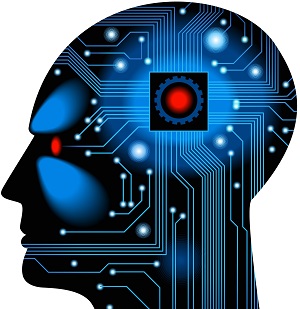06 Mar Inference in the Face of Uncertainty
 Do you know what I’m about to say? If your mind were not able to race ahead of the words and build a set of expectations about what comes next, you may not be able to understand me speaking or writing. But you can predict a lot more than your conscious awareness tells you. A lot of your expectations are operating at a subconscious level, and that’s a good thing. Otherwise it would be hard to keep up. The expression “my mind was racing” is no overstatement. In fact, it is possible that it is racing all the time. But the competition is more like an internal struggle for understanding versus confusion, or missing something important. As we’re just getting seriously into this section on Fuzzy Logic, I will revisit the components of thought, then dive into inference in knowledge theory and uncertainty.
Do you know what I’m about to say? If your mind were not able to race ahead of the words and build a set of expectations about what comes next, you may not be able to understand me speaking or writing. But you can predict a lot more than your conscious awareness tells you. A lot of your expectations are operating at a subconscious level, and that’s a good thing. Otherwise it would be hard to keep up. The expression “my mind was racing” is no overstatement. In fact, it is possible that it is racing all the time. But the competition is more like an internal struggle for understanding versus confusion, or missing something important. As we’re just getting seriously into this section on Fuzzy Logic, I will revisit the components of thought, then dive into inference in knowledge theory and uncertainty.
| Understanding Context Cross-Reference |
|---|
| Click on these Links to other posts and glossary/bibliography references |
|
|
|
| Prior Post | Next Post | |
| Decide on Fuzzy Logic | Inference in the Face of Uncertainty | |
| Definitions | References | |
| Graceful degradation | TechTarget Reference | |
| Fuzzy Logic | TechTarget Explanation | |
| inference knowledge | Adams | 1982 |
Components of Thought
The following questions are central to cybernetic research in general and this blog in particular:
- What specific characteristics of neurons and their components can enable them to process information?
- If neurons represent data, how is the data represented? How much data can be stored?
- If data is stored implicitly, is all data alike? If all data is alike, are there different regions for different types of data? If so, how do different data types interact? How are the regions coordinated?
- If data is explicitly represented in the brain, how is data written to long-term storage?
 What components hold the data?
What components hold the data?- How are the different types of data represented?
- How are multiple data sources integrated?
In the sections on the brain, neurons, and their connections, I tried to answer, as best I could, the first few questions. I intend to continue to post, and update my posts, as I get more information. The answers seem to point to certain levels of electrical activity leading to certain thoughts, ideas, decisions and actions. As we examine the psychology of cognition and our fuzzy reasoning capabilities, I’ll try to lay a foundation for my approaches to modeling intelligence in computer systems.
At the Edge of Certainty
 “In a world that’s constantly changing, how can I be sure…” These are the words to a song that rose out of the tumultuous protest era of 1960s America (reference my post – “Did You Change Your Mind?”). Sadly, the answer is simple: we can’t always be sure. Spock and Tevye are appealing characters because they are like us – they grapple with uncertainty, they find the fight is hard, and they sometimes experience things (such as daughters and humans) they are ill-prepared to deal with. Nevertheless, we are equipped to find answers, make decisions, and succeed, even in the face of uncertainty. That’s the way it is with sentient beings. But what about computers?
“In a world that’s constantly changing, how can I be sure…” These are the words to a song that rose out of the tumultuous protest era of 1960s America (reference my post – “Did You Change Your Mind?”). Sadly, the answer is simple: we can’t always be sure. Spock and Tevye are appealing characters because they are like us – they grapple with uncertainty, they find the fight is hard, and they sometimes experience things (such as daughters and humans) they are ill-prepared to deal with. Nevertheless, we are equipped to find answers, make decisions, and succeed, even in the face of uncertainty. That’s the way it is with sentient beings. But what about computers?
New techniques enable computers to deal with uncertainty. Less certainty naturally diminishes the ease with which a computer makes decisions, but computers that can work with incomplete and sometimes incorrect information are able to do more. They compute more like humans think than earlier computers that needed black-and-white input. Computers and programs that can deal with uncertainty are said to gracefully degrade. Graceful degradation means that when the system cannot generate a solution with a reasonable level of certainty, it will attempt a guess, replying with a possible solution. This solution is flagged with a certainty marker that lets the operator rate the solution’s reliability. Weighted certainty or confidence values are a “fuzzy logic” alternative to the rigid dichotomy of True-False logic. By applying weights to data elements, relations, and/or rules, a more intuitive mechanism for problem solving can be implemented.
Inference and Uncertainty
Inference is what we constantly do with our brains. Based on our perceptions, we make inferences about the state of things, about the consequences of actions, and about life, the universe, and everything (see Adams, 1982). Inference involves applying logic to new information derived from our senses and remembered information stored somehow in our brains, so we can form conclusions. Forming conclusions is important because we need to form conclusions before we act. If we fail to conclude that the path in front of us is free of obstacles, we will not proceed forward with impunity. If we fail to conclude that the object is light enough to lift, we will usually choose not to reach for it. If we fail to conclude that we are in danger of being struck by an object, we will not dodge it. The nice thing about a conclusion is that we can abandon it quickly if newer information prompts us to do so. As I add posts in this section, I intend to deal with the basic mechanisms and rules of inference we humans use. The philosophical foundations of different forms of logic are introduced, and useful applications for the various techniques are discussed.
| Click below to look in each Understanding Context section |
|---|








